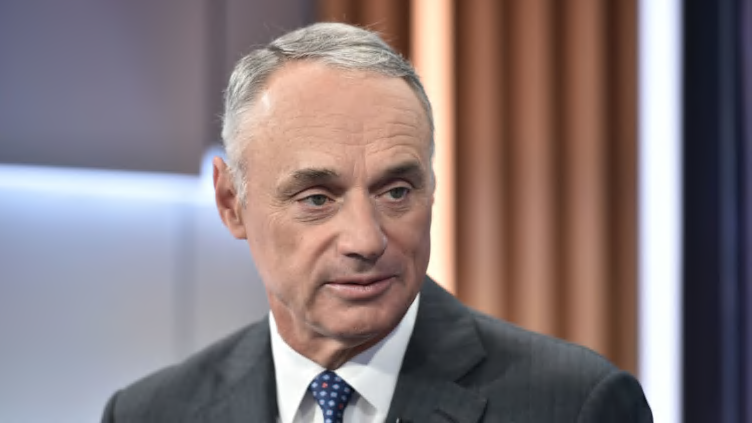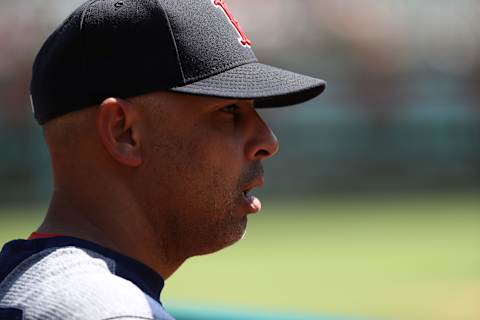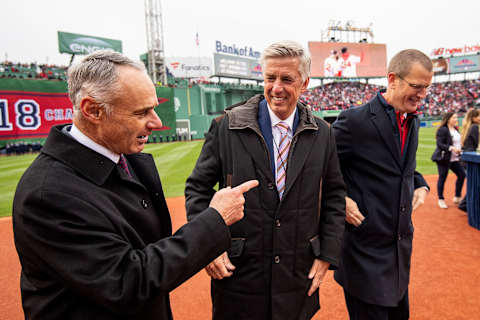Astros: No surprise as MLB botches Red Sox investigation

MLB Commissioner Rob Manfred predictably botched the investigation into the Red Sox illegally stealing signs, leaving Houston Astros fans seething but unsurprised.
The news we’ve all been waiting for finally came on Wednesday. MLB released the commissioner’s report from his investigation into allegations that the Boston Red Sox illegally stole signs during the 2018 season. Predictably, the so-called punishment was laughably light and was nothing more than a joke when compared to the much harsher penalties imposed on the Houston Astros.
A brief history is that the Astros were found to have used in-game video feeds to steal and decode signs between opposing teams’ pitchers and catchers during the 2017 season and early in 2018. They then communicated the incoming pitch selection to the batter at the plate in real time. This was a clear violation of league rules, so the Astros certainly deserved to be punished.
They were fined $5 million and lost their first and second round draft picks in both the 2020 and 2021 amateur drafts. Manager AJ Hinch and GM Jeff Luhnow were suspended for one year, and then fired by owner Jim Crane immediately after the report was released, despite the report indicating that neither was an active participant or encouraged the sign stealing.
The Red Sox, according to the commissioner’s report, committed less egregious violations. Apparently the sole perpetrator was the team’s video replay operator, J.T. Watkins, who on limited occasions used the in-game feed to decode signs and have them relayed to a runner on second base, who would then communicate the pitch selection to the batter.
Watkins was the only individual punished in this instance. Former Red Sox manager Alex Cora was suspended for the 2020 season as a result of his role in the Astros’ sign stealing scheme, as he was the club’s bench coach in 2017 before becoming Red Sox manager in 2018. But he escaped additional punishment as the report determined he did not know and had no reason to know of what Watkins was doing.
The punishment doled out to the Red Sox is limited to only the loss of a second round draft pick in 2020. There is no fine and no further loss of picks, and Watkins was only suspended for the 2020 season and prohibited from working in the replay room in 2021. No one was fired or otherwise punished for these violations.
There’s no shortage of issues with this report, especially when compared to the Astros report. They all lead to the inevitable conclusion that this could and should have been handled differently by Commissioner Rob Manfred.

Problems with the Report
Where do I start? Basically, in order to believe that both the Astros and Red Sox reports are the whole truth and nothing but the truth, you have to suspend logic and reason, so help you God. Trying to reconcile the two reports can make one’s head spin.
First, let’s start with what’s at least believable. I can believe and accept that what the Red Sox did was lesser in scope than what the Astros did. The Astros were certainly more brazen about it, what with their banging on trash cans to relay signs to hitters.
But there’s no way to convince me that Watkins acted on his own accord without any of the Red Sox coaches knowing about it. Claiming the video guy was the mastermind and somehow kept it hidden from the coaches in the dugout reeks of a cover-up. It sounds like he’s being thrown under the bus.
There’s also no way to convince me that Cora didn’t know. Manfred’s report on the Astros was clear that Cora was one of the primary architects of the scheme. We’re supposed to believe that he took over the Red Sox and not only gave up his nefarious ways, but was totally ignorant of such actions going on in his own dugout? Sell that to someone else.
I also couldn’t help but notice that according to the report, many Red Sox players stated they were unaware that using in-game video to decode signs was against the rules. That’s like a driver getting pulled over for speeding and claiming he didn’t know what the speed limit was despite the presence of clear and conspicuous signs. Either he’s lying or he wasn’t paying attention.
In 2018, being ignorant of that rule is no excuse, especially when the Red Sox were disciplined for using an Apple Watch to transmit decoded signs in 2017. They’d already been busted for breaking the rules, making them a repeat offender. The league made it public that using technology to steal and relay signs during games was prohibited. You can’t claim ignorance when you break the rule the following year.
Interestingly, it was Watkins who was named as the primary culprit in the Apple Watch incident too, which should have given Red Sox management every reason to know that something could be going on. Yet somehow he was allowed to continue to work as the replay operator with no apparent supervision.
Apparently, according to the report, there was some type of disconnect in communication. The Red Sox front office evidently was very thorough in its communication to the coaches and video staff of what the rules are. But somehow the players were not adequately advised of the rules. Sounds like a failure on the part of the coaching staff to me.
This fact only further points to Cora’s involvement, and it raises an interesting question. If Luhnow can get suspended for a year in part because he failed to adequately inform the coaching staff of these rules, why doesn’t Cora get any punishment for failing to advise his players?
Speaking of punishment, Cora’s suspension only goes until the end of the 2020 postseason. Hinch and Luhnow were suspended for a full year, which wouldn’t end until January of 2021. So Cora, who was the supposed mastermind of the Astros sign stealing operation, actually gets a shorter suspension than Hinch, who was opposed to it.
Further, in justifying Luhnow’s suspension, Manfred noted that the GM’s job is “to be aware of the activities of his staff and players.” Yet no one in the Red Sox front office was disciplined despite their failure to monitor Watkins, who had already been responsible for a violation of this same rule. Try and justify that.

Problems with the Investigation
In the end, the problems with the report boil down to one simple fact: Manfred could not prove anything more than what was outlined in the report. You can’t discipline someone for something you can’t prove they did, so in that sense, his hands were tied.
Unfortunately that was largely of his own doing. The breaking of the Red Sox allegations by The Athletic came out on Jan. 7, which was six days prior to the release of Manfred’s report on the Astros allegations. This means by the time MLB was investigating the Red Sox and interviewing players and staff, the Astros report had been made public and the fallout was taking shape.
Astros players were granted immunity in exchange for their full and truthful accounts of the sign stealing operation. This resulted in players being forthcoming and honest about what went on and who was involved. Thus, the scope of the league’s knowledge was exceptionally vast, especially when compared to the Red Sox situation.
Even though the Astros players avoided discipline, that doesn’t mean they avoided punishment. Their reputations have been tarnished, both in the eyes of fans and fellow players. They’ve been dragged through the mud and will continue to be labeled as cheaters and heckled by trolls for the rest of their careers. When it comes time for Hall of Fame voting for guys like Justin Verlander and Jose Altuve, who knows what the horde of holier-than-thou sportswriters will do?
The Astros being truthful also resulted in heavy discipline being levied against their club and their manager and GM. The legitimacy of their 2017 championship will be forever questioned. The black eye this scandal has left on the franchise will not go away for quite some time.
Knowing all this, what incentive would the Red Sox have to be truthful? Even with immunity, what reason would they have to be just as forthcoming as the Astros were? The fact that the Astros report was released before the Red Sox investigation took place is where Manfred really screwed up, because it gave the Red Sox reason to want to do damage control.
More from Climbing Tal's Hill
- Just how much better is the Houston Astros playoff rotation than the rest?
- Houston Astros: A Lineup Change to Spark Offense
- Astros prospect Hunter Brown throws 6 shutout innings in debut
- Always faithful Astros World Series champion Josh Reddick defends the title
- Michael Conforto declines Astros’ 2-year, $30 million offer
Now I don’t know if their sign stealing operation was any bigger than what the report said. I have no proof that Cora knew or that more than just a few players took part in it. But these are legitimate questions, especially when you consider that many fans expected the Red Sox to get a mere slap on the wrist in the first place.
Part of the issue, too, is that the Red Sox didn’t have a disgruntled player throwing his former team under the bus, a la Mike Fiers. With Fiers coming out in the open, there was no way for the Astros to do damage control anyway. The Red Sox didn’t have that problem.
But in order to conduct a thorough investigation, Manfred should have held the Astros report and released his findings on both teams simultaneously. With Cora being an obvious common denominator between the two, it would’ve been easy to justify doing so.
But I suspect he was more than happy to allow the Astros to be the bad guy while taking time to ease the blow on the Red Sox, one of the sport’s premier franchises. The fact that the Red Sox report was released the day after the Rob Gronkowski trade and the day before the NFL Draft suggests a desire to bury it.
In the end, I can’t say I’m surprised, and neither can most Astros fans. We’ve come to expect this sort of thing, which only reinforces the long-held notion that MLB has no problem treating the Astros like a second-rate franchise with a different set of rules than the blue bloods.